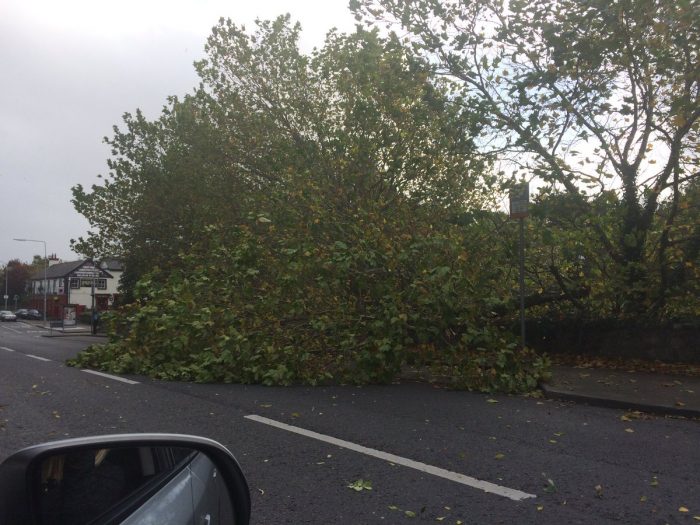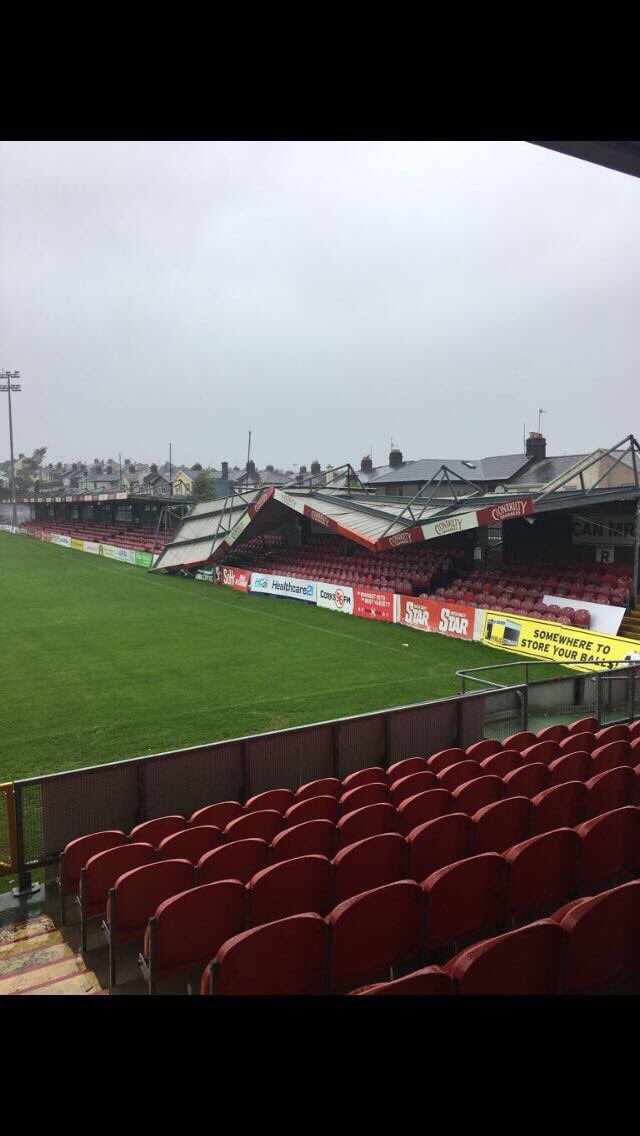
Trees already down in the Republic because of Storm Ophelia. A woman was killed in Co Waterford by a falling tree
THE south and west of Ireland is taking the full brunt of Storm Ophelia as it swept in from the sea and made land fall earlier today.
Derry and Donegal have battened down the hatches ahead of the storm reaching the North West this afternoon.
The general advice is to stay indoors until the high winds pass and don’t make any unnecessary journeys on roads in case of trees have been felled or power lines are cut down in the winds.
A woman was killed when a tree fell on her car in Co Waterford earlier today.
Winds smashed into Cork reaching speeds of 97 mph.
Around 100,000 homes and businesses are without power in Cork.
Derry City’s SSE Aitricity Premier Division match against Cork City tonight has been postponed until Tuesday after part of a stand at the Turner Cross ground collapsed.
Gerry Murphy of Met Éireann has provided an update.:
“Munster and south Leinster are experiencing the strongest winds. Then, as the storm pushes further north, the north midlands will get the strongest winds this afternoon.
“Now, those winds will not be as strong as you will get on the coast, but they will be exceptionally strong for those areas.
“Those areas have a lot of trees and buildings that are not used to winds like that; so the potential for structural damage and fallen trees will be quite great basically anywhere in the country.”
The Irish Government has issued advice for all householders and business owners as the storm sweeps across the country,

Part of the stand at Turners Cross ground in Cork has collapsed force tonight’s game against Derry City to be postponed
BEING PREPARED FOR EMERGENCIES:
Personal Plans
The most important people to think about in any emergency situation are the people in your immediate family and household. When making your plans and preparations there are certain things that you will need to bear in mind:
- You may be separated from each other.
- You may not be able to communicate.
- Power supplies may be cut.
- You or other members of your family may be injured, possibly seriously.
- You may find yourselves in a dangerous situation involving fire, flooding or other elements.
To be prepared you should ensure that you have spoken to your family and with your immediate neighbours about what you might do. Include some or all of the following suggestions in your plans to stay safe:
- Decide how best to stay in touch with family members in an emergency situation.
- If not at home, agree how you will contact each other, who will pick up the children from school and who will check on elderly or disabled family members or neighbours.
- In case you are separated, decide on a member of your family (who may live in another location) who you will all contact to let everyone know you are safe.
- Make sure everybody knows this person’s address, home, mobile and work numbers. Give these details to your own workplace and to your children’s school.
- Agree on a place that you will all meet if separated.
Storing Key Documents
Store important documents safely
In most emergency situations your immediate concern will be your safety and in the event of an evacuation all household items and belongings should be left behind. However, in emergencies where there is no immediate danger, you may have time to look for important documents before leaving your home. So, it’s important to ensure that they are all kept in the same place.
It’s a good idea to keep the following in a waterproof container or small portable safe in a safe place where it can easily be retrieved:
- Wills
- Passports
- Photos
- Birth and marriage certificates
Who and What to listen to
Radio and TV warnings
In major emergency situations it may be necessary to issue warnings via the national media advising you on the best course of action. Such messages would normally be broadcast on all national radio and TV channels.
Remember you may not have power, so it’s important to keep a battery-operated radio handy.
It is anticipated that your local radio station will also carry key messages
Learn about safety in your home
- Find out how and where to turn off electricity, gas and water supplies in your home.
- Make sure you know the numbers of your local Garda station, GP, Bord Gáis, ESB and your local council and keep them near your phone.
- Dial 999 or 112 for immediate connection to fire and ambulance services and if you require emergency Garda assistance.
Learn some basic first aid
Knowing the basics of first aid can be very useful in any emergency and can prevent further injury or distress. Basic courses are regularly run by your local St. John’s Ambulance, Irish Red Cross, Civil Defence and in many community colleges.
Prepare an emergency kit and keep it handy
The following items may prove invaluable in helping you stay safe and cope with a range of emergency situations:
- Battery-operated radio (with spare batteries).
- Torch (with spare batteries), candles and waterproof matches.
- First aid kit and manual.
- Medication, toiletry and sanitary supplies.
- Special needs for infants, the elderly and family members with disabilities.
- Spare clothes and sleeping bags for each family member.
- Mobile phone, charger and spare battery.
- Strong plastic bags (for clothing, valuables, documents and photographs).
- Copies of important family documents (birth certificates, passports and licences).
- Contact details for your agreed family contact.
- Playing cards or games for young children.
What to do if you have to remain in your home for a period of days
You should try to make sure the following will be available in the event of an emergency where power, gas and water supplies have been cut:
- Make arrangements to have essential supplies (food and water) stored somewhere in your home, to last for up to three days.
- Duct tape and a sheet of plastic to seal windows, scissors and a Swiss army knife.
- Fire extinguisher.
Tags:





